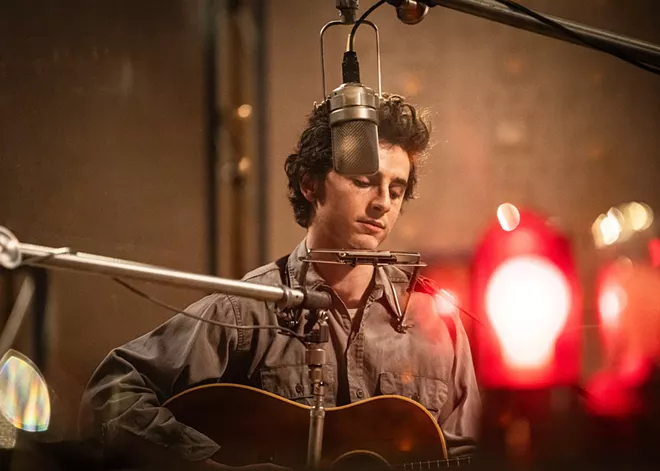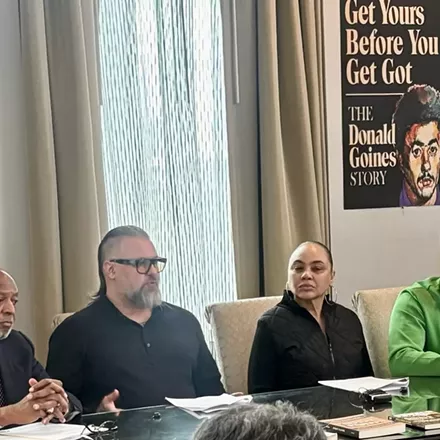It's become a running joke among film critics and cinephiles that Jake Kasdan's 2007 parody Walk Hard: The Dewey Cox Story was so effective that it destroyed the idea of the conventional music biopic. The truth, though, is that clichéd music biopics have flourished at the box office since then, and audiences are apparently eager to see the lives of famous musicians presented in a straightforward, comforting manner. Director James Mangold's 2005 biopic about Johnny Cash, Walk the Line, was the primary target of Walk Hard, yet Mangold himself is back with another rote biopic about a great musician — the Bob Dylan portrait, A Complete Unknown.
At least Mangold isn't entirely copying his own formula with A Complete Unknown, which hones in on a relatively brief period in Dylan's sprawling career: his arrival in New York City in 1961 to his controversial performance at the Newport Folk Festival in 1965. It still feels like little more than an illustrated Wikipedia entry, despite some strong supporting performances and a decent eye for period detail. Timothée Chalamet rarely rises above an effective impression in his performance as Dylan, who arrives from Minnesota determined to visit his hero, ailing folk singer Woody Guthrie (Scott McNairy), in the hospital.
That's where Dylan meets fellow folk singer Pete Seeger (Edward Norton), who takes Dylan under his wing and helps him become a folk music sensation... and, soon after, a major pop star. The tension between Seeger's mentorship of the young upstart and Dylan's increasing disdain for the constraints of folk music is the most interesting thematic thread in A Complete Unknown, and Norton gives the movie's best performance as a genial, well-intentioned artist who's slowly realizing that pop culture is passing him by.
Once Dylan starts performing in the smoky NYC coffeehouses that are home to the burgeoning folk scene, it doesn't take long before he catches the eye of both manager Albert Grossman (Dan Fogler) and the already popular folk singer Joan Baez (Monica Barbaro). Grossman barrels his way into representing Dylan, but this isn't the familiar story of an unscrupulous manager taking advantage of a naïve musical talent. Dylan always seems fully in control of his career, even when that means angering his fellow musicians and, later, his own fans.
Time would prove Dylan right on pretty much all counts, but that didn't make him a pleasant person to be around, and Mangold and co-writer Jay Cocks never successfully capture the source of Dylan's genius. The songs are brilliant because they're classics that have stood the test of time, but in the moment they're still untested, and Mangold relies on simplistic wonder to convey that brilliance. It's almost comical how many awed reaction shots Mangold cuts to when Dylan breaks out a now-iconic song like "The Times They Are a-Changin'" for the first time.
Dylan starts dating painter and activist Sylvie Russo (Elle Fanning) seemingly for no reason other than narrative expedience, and the character inspired by Dylan's real-life girlfriend Suze Rotolo never comes off as more than a convenient composite. Barbaro brings more dimensions to Baez, whose on-again, off-again affair with Dylan was the subject of some of her own later work, and who pushes back on Dylan's self-centered perspective.
At one point, Baez calls Dylan an asshole, but his assholishness remains as inscrutable as his talent. In reality, Dylan is famously unknowable, one of pop culture's most mysterious figures despite decades in the spotlight. Filmmaker Todd Haynes leaned into this idea with his impressionistic 2007 film I'm Not There, which takes an oblique approach to Dylan's life and music. Haynes' film has more artistic kinship with Dylan even if it never directly depicts any of his actual history. Mangold opts for fictionalized but realistic drama, which has neither the advantage of true verisimilitude, nor the freedom of formal experimentation.
Instead, Mangold leaves all the experimenting to Dylan, who soon grows restless with the sparse folk sound that has made him famous and recruits an impromptu band for a shift into full-on electrified rock and roll. That shift culminates in his 1965 set at Newport, where purists like Seeger beg him not to commit what they see as a betrayal by performing his raucous new songs. Mangold's old pal Johnny Cash (played by Boyd Holbrook rather than Walk the Line star Joaquin Phoenix) shows up to encourage Dylan, in a clumsy passing-of-the-guard between both musicians and biopics.
It's all handsomely shot and mildly engaging, with great music that is of course greater in its original form. The overall effect for both Dylan fans and newcomers will be to encourage giving Dylan's albums another spin, which isn't a bad thing. There's just no need to sit through two hours of somber cosplay in order to get there. ♦




















